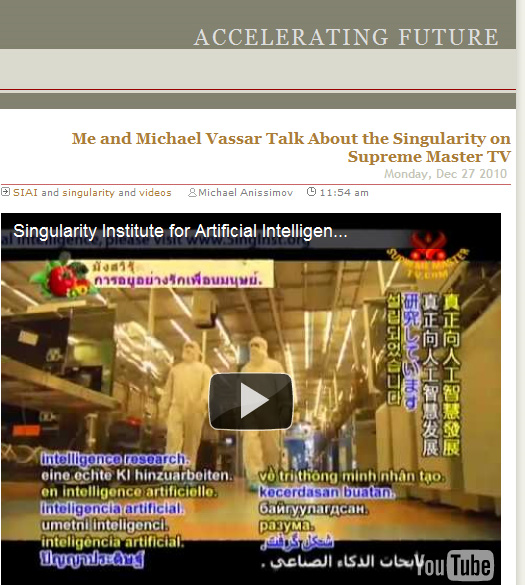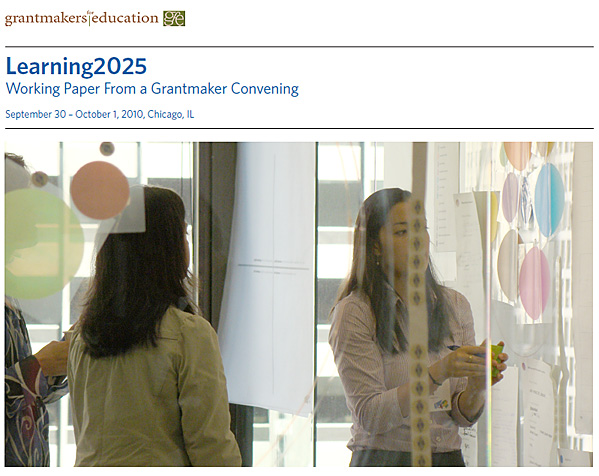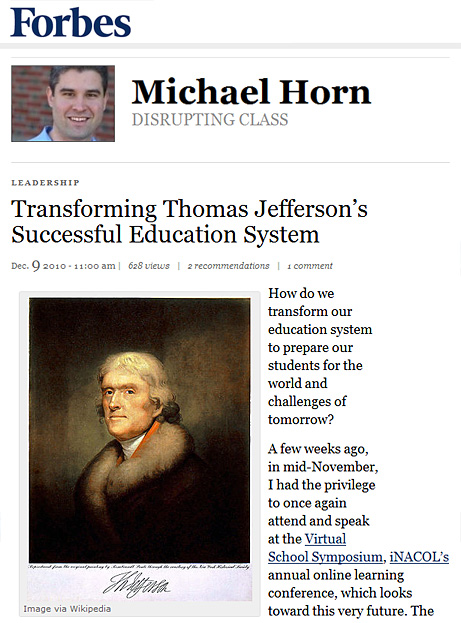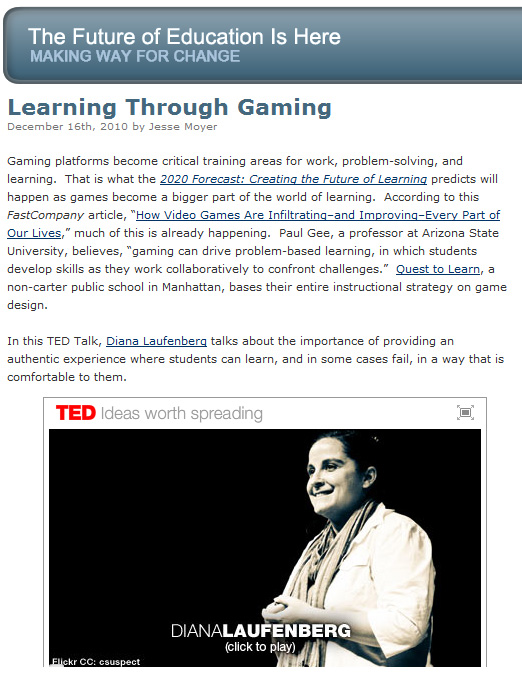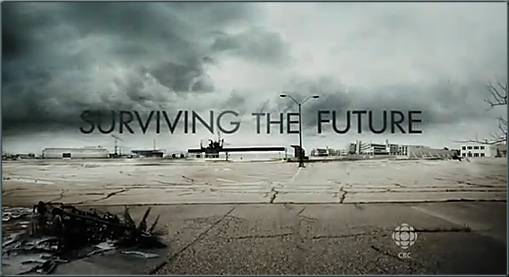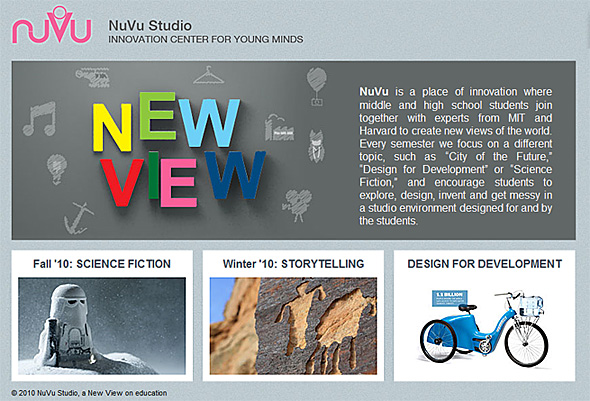From DSC:
Again, some of this is fascinating to me, while other portions of this is very unnerving and controversial to me.
How my predictions are faring — by Ray Kurzweil, October 2010
How my predictions are faring In this essay I review the accuracy of my predictions going back a quarter of a century. To my knowledge, a comprehensive exercise along these lines is reasonably unique. Included herein is a discussion of my predictions from The Age of Intelligent Machines (which I wrote in the 1980s), all 147 predictions for 2009 in The Age of Spiritual Machines (which I wrote in the 1990s), plus others. Perhaps my most important predictions are implicit in my exponential graphs. These trajectories have indeed continued on course and I discuss these updated graphs below.
My core thesis, which I call the “law of accelerating returns,” is that fundamental measures of information technology follow predictable and exponential trajectories, belying the conventional wisdom that ?you can‘t predict the future. There are still many things — which project, company or technical standard will prevail in the marketplace, or when peace will come to the Middle East — that remain unpredictable, but the underlying price/performance and capacity of information is nonetheless remarkably predictable. Surprisingly, these trends are unperturbed by conditions such as war or peace and prosperity or recession.
From DSC:
As a beginning futurist, I am very interested in Ray’s work. However, I am also highly suspect of ever linking up the words “spiritual” and “machine” — and, in fact, this makes me wonder what agenda(s) may be underlying some of these perspectives.
A Dickens of a Year — from neXtedu
Quoting from this posting:
“My take is that in 2020, with perfect hindsight vision, 2010 is going to be viewed as the year when education change and innovation launched into orbit. Many have said that we need a “Sputnik” moment in education—I think we just had a Neil Armstrong “one small step for man-one giant step for mankind’ year for the learning industry.
- Newly posted videos of past keynote speeches — from Futurist.com by Catherine Otten
- Glen Hiemstra’s blog at Futurist.com
Learning technology trends to watch in 2011 — from The e-Learning Coach
- Growth of Social Learning
- To LMS or Not
- Pocket Video Technology
- Mobile
- iPad or Alt-Tablets
- Virtual Worlds Rising Up
- Augmented Reality
- Blogs
- eBooks
- QR Codes
Top 10 Ed Tech predictions for 2011 –– from ZDNet.com by Christopher Dawson; featuring insights from Adam Garry, Dell’s manager of global professional learning
- “1:1 should be a learning initiative instead of a tech initiative”
- Personalized learning instead of differentiated instruction
- Product-based assessments
- Increased focus on conceptual learning
- The evolution of 1:1 – Different access models
Veteran Trainer from McDonald’s U Describes The 2020 Workplace (Interview) — from Bloomfire.com by Nemo Chu
Recommended by McDonald’s University’s Dan Camp:
The 2020 Workplace is one of the most fascinating books I’ve read recently. Think about how life has changed in the last ten years. In 2000, the world was not conducting 34,000 Google searches per second. Cell phones were still seen as a luxury for most of the world. There was no such thing as Facebook, Twitter, LinkedIn, or iTunes. And the idea of being always on, and always connected—“hyper-connected”—was only seen in the movies.
From the book’s description at Amazon.com:
The 2020 Workplace begins by setting the stage for why the future workplace is going to be different. Advances in social technologies, shifts in demographics, and a global business environment will all affect the workplace of the future. The Millennial generation is a particular focus, since it is expected to be nearly 50% of the workforce in just four years.

— from nextbigfuture.com
.
“Surviving the future is an unsettling glimpse into the human psyche right now, as our culture staggers between a fervent belief in futuristic utopian technologies on the one hand, and dreams of apocalyptic planetary payback on the other. Thought provoking and visually stunning, Surviving the Future looks at the stark and extreme choices facing our species as we prepare ourselves for the most challenging and consequential period in our history.”
— from http://www.cbc.ca/documentaries/doczone/2010/survivingthefuture/
.
As seen as CBC-TV on Thursday Oct-21-2010
.
— originally from http://geraldcelentechannel.blogspot.com/2010/11/surviving-future.html
From DSC:
Although I don’t agree with many things in this piece, it’s important to reflect upon some of the sometimes exciting and sometimes disturbing things in this piece. Looking at some of the enormous challenges and potential directions ahead of us this century, it’s all the more important that our hearts are hearts of flesh, not hearts of stone!
Wharton, Rebooted — from InsideHigherEd.com (emphasis below from DSC)
The nation’s oldest graduate school of business is adopting sweeping changes to its M.B.A. curriculum that come with a unique acknowledgment: two years of study alone cannot prepare graduates for decades of future unpredictability.
The changes at the Wharton School of the University of Pennsylvania, which were supported by 87 percent of its faculty members in a vote last week, call for a more flexible menu of core courses, a greater emphasis on ethics, and new requirements designed to make students better communicators and judges of risk. They also promise future training — free — to graduates every seven years.
…
Wharton’s solution is to offer tuition-free executive education training to future graduates of its master’s in business administration program, in what it dubs a “radically new vision of business education as a lifelong ‘knowledge partnership.’ “
…
“In higher education, we generally think of degrees in the front-loaded sense: here’s everything you need to know and then we wish you the best,” he said. “This commitment they’ve made to career-long executive education is not only something that has changed the competitive landscape in business education, but also fits perfectly into our belief that management education is not something you can manage in just two years or one year.”









